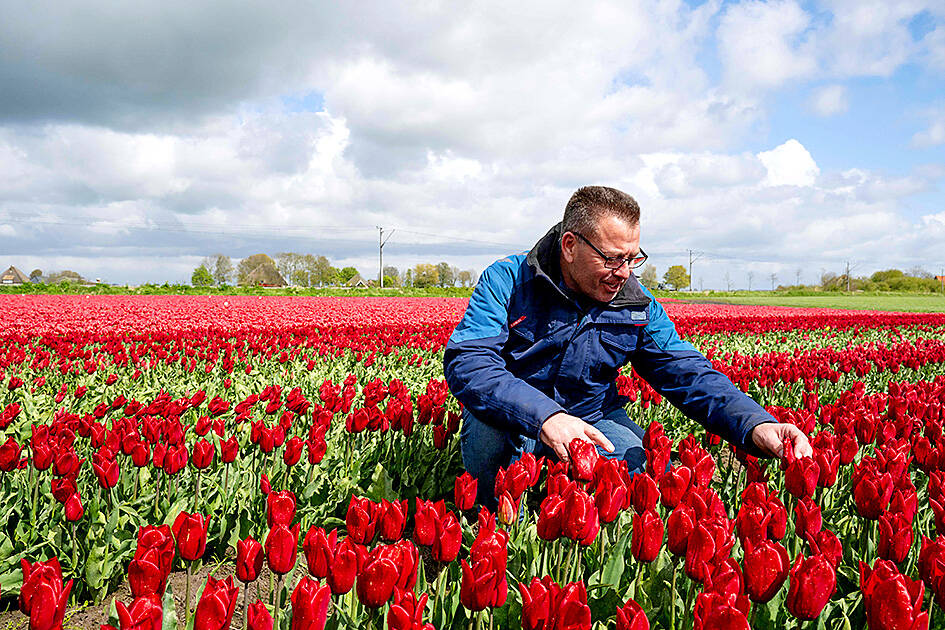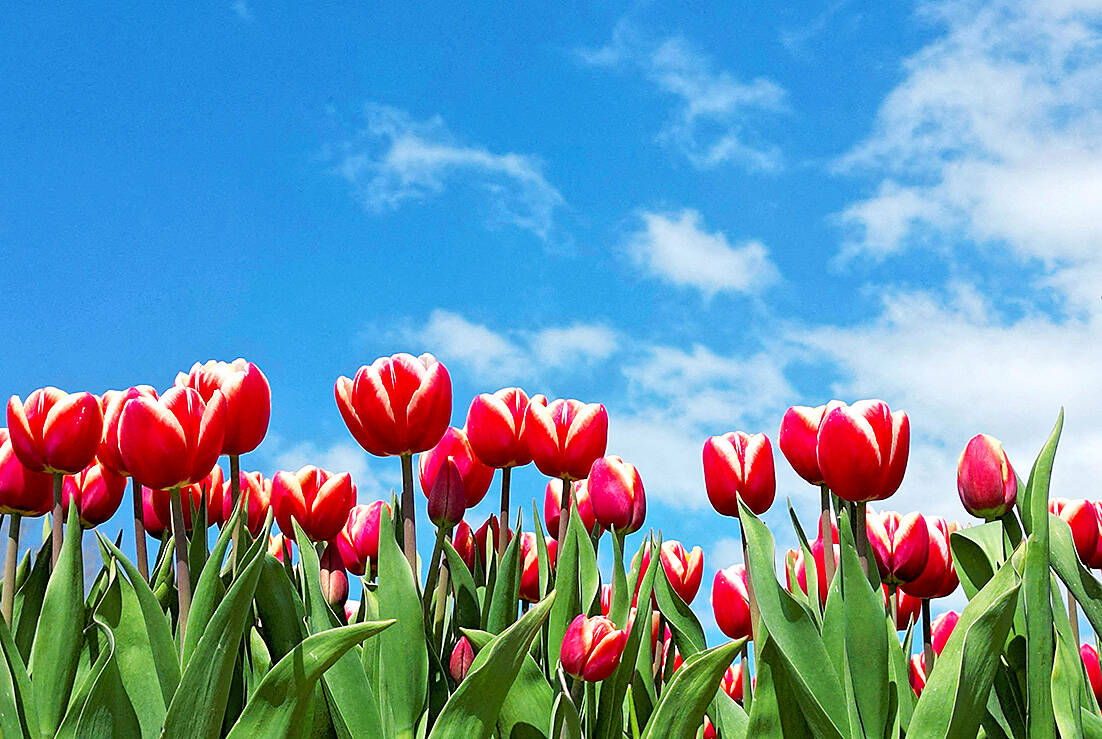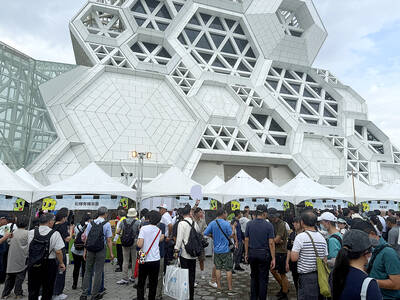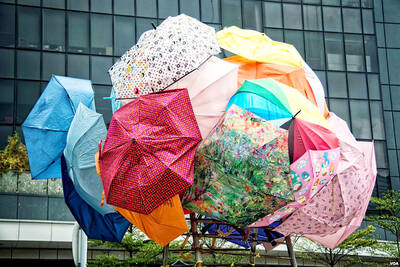Arjan Smit gazes out over his tulip fields, a riot of red and pink flowers he has cultivated all his adult life and part of a family business his grandfather started in 1940.
The 55-year-old has seen many changes over a long career but he says climate change is making an all-consuming profession even harder.
“The climate has changed. We can feel that. We have more wet periods. Last year, it was just raining, raining, raining and you can see the result,” he said.

Photo: AFP
From a distance, the fields of Smitflowers are a picture-perfect row of flowers, the type found on Dutch tourist brochures that attract visitors from around the world.
But he also pointed to muddy gaps, where tulips have fallen victim to the rain.
“It’s sometimes hard. Last winter, it was very wet. In total in our sector, we lost around eight to nine percent of the bulbs in the field. They were killed by water,” said Smit.

Photo: Reuters
“And we planted four percent fewer. That means we are now starting to harvest our bulbs but we have lost a minimum of 13 percent of the new bulbs for next year.”
As the world heats up, the atmosphere contains more water vapor, meaning wetter winters.
And rising temperatures mean hotter spring and summer periods in the Netherlands — a deadly combination for tulip farmers.
“When I started this work around 30 years ago, we had to water (the fields) two to four times in a (spring) season,” said Smit.
“In the last 10 years, sometimes we have to water every week. That means 10 times... It’s much more expensive. That’s sometimes hard,” he said.
‘DIFFICULT SITUATION’
Smit produces 11 million tulips of all different varieties in a year-round operation combining natural cultivation with a huge greenhouse and cool room system in the winter.
Lining his office walls are pictures of Smit flowers in famous hands, including him offering a bouquet to Queen Maxima.
“King Willem-Alexander was really jealous,” he grinned.
But the challenges for Smit and his trade were laid bare in late April, when sun, biting wind, torrential rain and hail all came in one single day.
This all adds up to a “difficult situation” for the tulips at the moment, explained Smit.
As the winter was so wet, the roots did not grow down far enough in search of water, with a knock-on effect for the summer.
“I’m very afraid now... that in a warm period they will not have enough roots to drink all the water they need and they will die again and we will have a very bad harvest period.”
The answer for Smit and his 18 staff is constant vigilance.
“All we can do to adapt (to climate change) is to be awake 24/7, to see what is happening with your products on the field, what they need,” he said.
‘CATASTROPHIC’
If climate change is a longer-term challenge, Dutch tulip farmers are fretting about an even more imminent threat — increased Brexit border controls.
Since yesterday, physical checks are now required for many plants and flowers entering Britain. Traders on both sides are worried about delays and damaged produce.
Tim Rozendaal, from Dutch Flower Association VGB, said there was still “uncertainty about waiting times” and “not yet sufficient” capacity to carry out the checks.
“Companies say they are considering not sending plants during the first week of border controls,” said Rozendaal, amid reports from Britain of garden centers stockpiling.
Smit estimates around 80 percent of his crop ends up abroad — he sells directly to an exporter — and any delay during border checks would be “catastrophic” for the flowers.
Despite the challenges, the genial farmer is upbeat about the prospects for his son, 22-year-old Tim, who will be the fourth generation Smit running the family business.
“It’s hard but when you control this in a good way, you can have a good profit in the bulbs industry, in the flower industry... We have to not stay still, not sleep,” he said.
He believes strongly in the positive impact of flowers and donates to cities in war-torn Ukraine, including Bucha, the site of the infamous massacre by Russian troops.
Proudly showing pictures of a Smitflowers on display in Ukraine, his emotions come to the surface.
“I was silent there. People came to me with tears in their eyes and their voices breaking, saying ‘Thank you for the flowers. It helps with our mental health’.”
“People can say what they want. We need flowers!”

Water management is one of the most powerful forces shaping modern Taiwan’s landscapes and politics. Many of Taiwan’s township and county boundaries are defined by watersheds. The current course of the mighty Jhuoshuei River (濁水溪) was largely established by Japanese embankment building during the 1918-1923 period. Taoyuan is dotted with ponds constructed by settlers from China during the Qing period. Countless local civic actions have been driven by opposition to water projects. Last week something like 2,600mm of rain fell on southern Taiwan in seven days, peaking at over 2,800mm in Duona (多納) in Kaohsiung’s Maolin District (茂林), according to

It’s Aug. 8, Father’s Day in Taiwan. I asked a Chinese chatbot a simple question: “How is Father’s Day celebrated in Taiwan and China?” The answer was as ideological as it was unexpected. The AI said Taiwan is “a region” (地區) and “a province of China” (中國的省份). It then adopted the collective pronoun “we” to praise the holiday in the voice of the “Chinese government,” saying Father’s Day aligns with “core socialist values” of the “Chinese nation.” The chatbot was DeepSeek, the fastest growing app ever to reach 100 million users (in seven days!) and one of the world’s most advanced and

The latest edition of the Japan-Taiwan Fruit Festival took place in Kaohsiung on July 26 and 27. During the weekend, the dockside in front of the iconic Music Center was full of food stalls, and a stage welcomed performers. After the French-themed festival earlier in the summer, this is another example of Kaohsiung’s efforts to make the city more international. The event was originally initiated by the Japan-Taiwan Exchange Association in 2022. The goal was “to commemorate [the association’s] 50th anniversary and further strengthen the longstanding friendship between Japan and Taiwan,” says Kaohsiung Director-General of International Affairs Chang Yen-ching (張硯卿). “The first two editions

It was Christmas Eve 2024 and 19-year-old Chloe Cheung was lying in bed at home in Leeds when she found out the Chinese authorities had put a bounty on her head. As she scrolled through Instagram looking at festive songs, a stream of messages from old school friends started coming into her phone. Look at the news, they told her. Media outlets across east Asia were reporting that Cheung, who had just finished her A-levels, had been declared a threat to national security by officials in Hong Kong. There was an offer of HK$1m (NT$3.81 million) to anyone who could assist